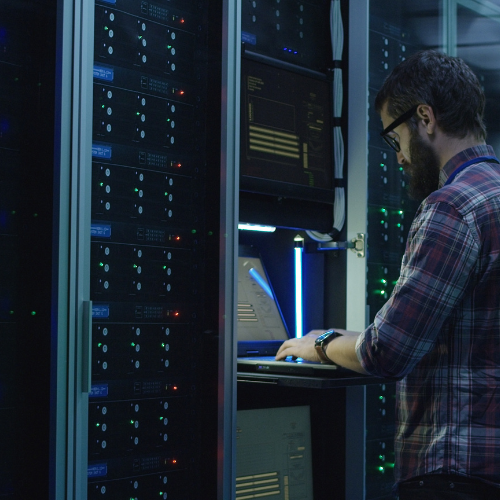Highlighting OF&S's commitment to operational excellence and the customer experience, a key initiative within the IT Excellence portfolio includes scaling and improving research technology. This initiative aims to speed up research by providing advanced tools, infrastructure, and full-service research computing capabilities.
What is Research Computing?
Research computing is about the use of data that is new, multifaceted, and often very big to solve complex problems or discover new phenomena. It includes advanced computers, storage, networking, software, and analysis tools to help researchers answer questions, uncover patterns, or see a problem in a new way. These resources enable researchers of all subject matter backgrounds to tackle complex problems and generate new scientific insights that might not be possible on laptop or desktop computers – or would take a very long time.
Expanding Resources and Enhancing Access
Over the past year, the university has significantly expanded its computing capacity. Once limited to one high-performance computing (HPC) system requiring special expertise to operate, the Center for Research Computing (CRC) now offers three systems for our researchers. The storage capacity has also tripled, helping researchers to utilize much larger datasets, share them with collaborators, or make them available for public access.
Why It Matters
Expanding research computing is not just about technology—it’s about growth. These powerful tools help Rice attract top faculty, secure competitive research funding, and boost its reputation as a leading research university. The improved infrastructure also helps current faculty and students work faster, smarter, and more efficiently.
Impact on Research
Our shared HPC systems support researchers across several departments in Engineering and Natural Sciences, and this is expanding into Social Sciences and Business. FY24 research funding for NOTS HPC users totaled $51.3M.
The CRC also collaborates with faculty in the Humanities and Social Sciences to develop tools for geospatial mapping, data analysis, and visualization. These projects often concern public or community challenges, ranging from the effects of Houston’s highway systems on neighborhood housing, the location of orphan oil wells and water sources, to a Global Glacial Casualty List.
Supporting Research and Learning
The CRC offers workshops, training, and support to help faculty and students use these resources effectively. From cloud computing to artificial intelligence, researchers across all disciplines are using these tools to push the boundaries of their fields. The CRC’s new office hours program also helps students develop key skills while working on complex computational tasks.
Rice’s investment in research computing is transformational. By providing more powerful tools and greater access, the university is driving innovation, enhancing research, and positioning itself to attract top talent. This bold move ensures that Rice’s faculty, students, and researchers have the resources they need to excel and shape the future.

